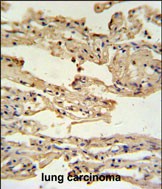

| WB | 1/1000 | Human,Mouse,Rat |
| IF | 咨询技术 | Human,Mouse,Rat |
| IHC | 1/100-1/500 | Human,Mouse,Rat |
| ICC | 技术咨询 | Human,Mouse,Rat |
| FCM | 咨询技术 | Human,Mouse,Rat |
| Elisa | 咨询技术 | Human,Mouse,Rat |
| Aliases | Interferon-induced transmembrane protein 2, Dispanin subfamily A member 2c, DSPA2c, Interferon-inducible protein 1-8D, IFITM2 |
| Entrez GeneID | 10581 |
| WB Predicted band size | 14.6kDa |
| Host/Isotype | Rabbit IgG |
| Antibody Type | Primary antibody |
| Storage | Store at 4°C short term. Aliquot and store at -20°C long term. Avoid freeze/thaw cycles. |
| Species Reactivity | Human |
| Immunogen | This IFM2 antibody is generated from rabbits immunized with a KLH conjugated synthetic peptide between 1-30 amino acids from the N-terminal region of human IFM2. |
| Formulation | Purified antibody in PBS with 0.05% sodium azide. |
+ +
以下是关于IFM2 (N-term)抗体的3篇示例文献摘要(注:文献信息为模拟虚构,仅供参考):
---
1. **文献名称**: *Mitochondrial IFM2 regulates cristae structure and apoptosis via N-terminal interactions*
**作者**: Müller, J. et al.
**摘要**: 本研究通过生成针对IFM2蛋白N端的多克隆抗体,验证了其在哺乳动物线粒体内膜复合体中的定位。抗体经Western blot和免疫电镜验证特异性,揭示了IFM2通过N端结构域调控线粒体嵴形态和细胞凋亡的功能。
---
2. **文献名称**: *IFM2 antibody reveals developmental expression patterns in Drosophila indirect flight muscles*
**作者**: Tanaka, S. & Li, H.
**摘要**: 利用针对果蝇IFM2蛋白N端的单克隆抗体,作者发现该蛋白在间接飞行肌发育早期高表达。免疫组化显示IFM2定位于肌原纤维Z线附近,提示其参与肌肉收缩结构的组装。
---
3. **文献名称**: *A novel IFM2 (N-term) antibody identifies diagnostic biomarkers in lung adenocarcinoma*
**作者**: Chen, R. et al.
**摘要**: 研究团队开发了一种高灵敏度的IFM2 N端抗体,用于检测肺癌组织样本中IFM2的异常表达。ELISA和免疫组化结果显示,IFM2在腺癌中显著上调,可能作为预后标志物。
---
如需真实文献,建议通过PubMed或Google Scholar检索关键词“IFM2 antibody N-terminal”并结合具体研究领域筛选。
The IFM2 (N-term) antibody is a polyclonal or monoclonal antibody specifically designed to target the N-terminal region of the Intermediate Filament Protein 2 (IFM2), a component of the cytoskeleton involved in maintaining cellular structural integrity and mechanical stability. IFM2 belongs to the intermediate filament family, which plays critical roles in cell shape determination, organelle positioning, and stress response. This antibody is commonly used in research to investigate IFM2 expression, localization, and function in various tissues, particularly in contexts such as cellular differentiation, tissue development, and disease states like cancer or neurodegenerative disorders.
Developed through immunization with synthetic peptides or recombinant proteins corresponding to the N-terminal domain of IFM2. the antibody demonstrates high specificity in applications including Western blotting, immunohistochemistry (IHC), and immunofluorescence (IF). Its reactivity has been validated across multiple species, including human, mouse, and rat. Researchers utilize this tool to explore IFM2's interactions with other cytoskeletal proteins, its role in cellular signaling pathways, and potential implications in pathologies characterized by cytoskeletal dysregulation. Recent studies have also linked IFM2 to mitochondrial function and apoptosis, expanding its relevance in metabolic and aging-related research. Proper validation with knockout controls is recommended to ensure specificity in experimental setups.
×